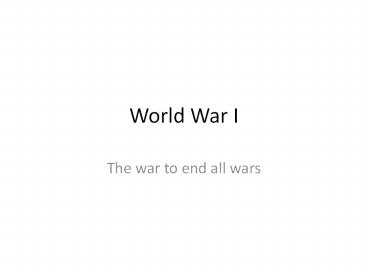World War I - PowerPoint PPT Presentation
Title:
World War I
Description:
In severe cases, cell damage in the lungs leads to fluid buildup in the lungs, ... German machine gun trench. Death on the Battlefield. German remains at Verdun ... – PowerPoint PPT presentation
Number of Views:88
Avg rating:3.0/5.0
Title: World War I
1
World War I
- The war to end all wars
2
By The Numbers
3
Mobilized
Dead Wounded Missing/PoW
Russia 12,000,000
1,700,000 4,950,000
2,500,000 Germany 11,000,000
1,773,700 4,216,058
1,152,800 Great Britain 8,904,467
908,371 2,090,212
191,652 France 8,410,000
1,375,800 3,266,000
537,000 Austria-Hungary 7,800,000
1,200,000 3,620,000
2,200,000 Italy
5,615,000 650,000 947,000
600,000 US
4,355,000 126,000
234,300 4,526 Turkey
2,850,000 325,000
400,000 250,000 Bulgaria
1,200,000 87,500
152,390 27,029 Japan
800,000 300
907 3 Romania
750,000 335,706
120,000 80,000 Serbia
707,343 45,000
133,148 152,958 Belgium
267,000
13,716 44,686 34,659
Greece 230,000
5,000 21,000
1,000 Portugal 100,000
7,222 13,751
12,318 Montenegro 50,000
3,000 10,000
7,000
4
(No Transcript)
5
The Soldiers
6
French soldiers waiting for their meal.
7
Trench with French soldiers
8
The Shell-Shattered Area of Chateau Wood, Flanders
9
Scene in the trenches
10
Looking out from the entrance of a captured
Pill-Box on to the shell ravaged battlefield.
11
German POW, Spring 1918
12
Child Soldiers
13
Poison Gas
14
The three main types used were - chlorine,
phosgene and mustard gas. Chlorine - a greenish,
yellow heavier than air gas which in its pure
form is an oxidizing agent. This means that it
will react in the presence of water to cause a
chemical burning effect on organic matter. Mucus
tissues of the human body are susceptible to such
chemical reaction because of 1) their organic
nature and , 2) they are always covered with a
film of water. Symptoms of chlorine gas poisoning
include vomiting, difficulty in breathing, a
burning sensation in the lungs, eyes, nasal and
mouth passages, watery eyes. In severe cases,
cell damage in the lungs leads to fluid buildup
in the lungs, loss of consciousness through
suffocation, and death. Phosgene - a colourless,
odorless, heavier than air gas formed by heating
carbon tetrachloride. It is highly poisonous in
that it will preferentially replace oxygen in the
cells and quickly causes an oxygen debt within
the body, unconsciousness and death. Mustard gas
- a caustic gas with a distinctive mustard smell,
it causes blistering and huge sores on any
exposed tissue, internal or external. Probably
the most used gas, with phosgene, in the war. A
nasty piece of business.
15
Poison Gas Attacks
16
American soldier wearing his gas mask
17
Gas attack seen from an airplane
18
Gas masks for man and horse demonstrated by
American soldier
19
Effects of Mustard Gas
20
Trench Warfare
21
British Trench Diagrams
- Taken from the British reference manual on Trench
Warfare, British Trench Warfare 1917-1918. The
manual was originally prepared by the General
Staff at the British War Office
22
(No Transcript)
23
(No Transcript)
24
(No Transcript)
25
(No Transcript)
26
Schematic Illustration of trenches from a French
magazine.
27
German trenches
28
Soldiers of the US 332 Infantry, 83rd Division in
trenches with the Italians on the Piave
29
US 18th Infantry, 1st Division troops in front
line trench, 20 Jan 1918
30
Hand-grenade Combat
31
Russians fighting while under gas attack
32
German machine gun trench
33
Death on the Battlefield
34
Dead French soldiers in the Argonne
German remains at Verdun
35
Death of a French regiment near Peronne
36
German dead in frontline trench on the Somme,
1916
Russian soldier dead on the wire
37
Destruction
38
Mt. Grappa
39
Avoncourt, France
40
Rheims, France
41
Shell Craters On The Battlefield
42
Verdun Cloister of the Hotel de la Princerie
43
Village of Esnes
44
Weapons of War
45
Machine Guns
46
Barbed Wire
47
Flamethrowers
48
Periscope Rifle
49
Phosphorus Grenade Exploding
50
Austrian Skoda 305mm howitzer
51
Krupp 420mm howitzer
52
Italian artillery battery
53
French 120mm guns
54
Krupp railroad gun
55
The Paris Gun
56
Advent of the Tank
57
French Renault PT-17 tank
58
Original British tank prototype "Little Willie"
59
British Mark I tank
60
German A7V tank
61
US Renault tank of C Company, 327th Tank
Battalion
62
'Who are they? What are they?' asked Sam
shuddering, turning to Frodo, who was now behind
him. 'I don't know,' said Frodo in a dreamlike
voice. 'But I have seen them too. In the pools
when the candles were lit. They lie in all the
pools, pale faces, deep deep under the dark
water. I saw them grim faces and evil, and noble
faces and sad. Many faces proud and fair and
weeds in their silver hair. But all foul, all
rotting, all dead. A fell light is in them.'
Frodo hid his eyes in his hands. 'I know not who
they are' "Yes, yes,' said Gollum. 'All dead,
all rottenThere was a great battle long
ago.... - J.R.R. Tolkien, The Lord of the
Rings






























